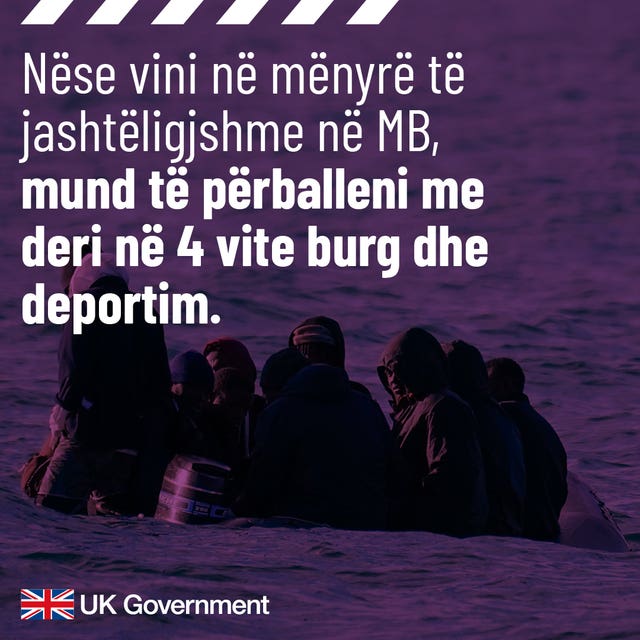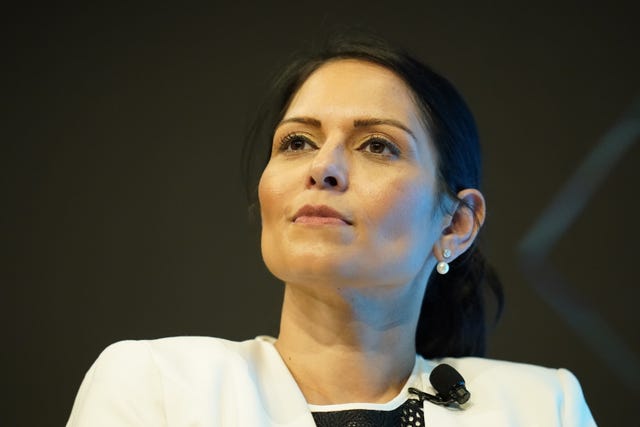Nearly 6,000 Albanians are thought to have crossed the Channel to the UK so far this year after numbers increased “substantially” over the last few months.
Albanians were rarely seen on migrant boats arriving on the south coast before this year but officials now believe this is the dominant nationality in the crossings, with numbers growing rapidly.
Some 2,165 were recorded as arriving between January and June 2022, compared with just 23 detected in the same period the previous year, according to a Home Office report published on Thursday.

It comes as Home Secretary Priti Patel struck a deal with the Albanian government to step-up police activity and fast-track removals in a bid to tackle crossings.
Officials say between 50% and 60% of arrivals are now thought to be from the south-eastern European country, many of which recently have been young men.
They fear crossings are becoming more dangerous – with the average number of people per boat now standing at 44 in August, compared to 28 in 2021 – and think it is remarkable there have not been any serious incidents, such as drownings, so far this year.
“The number of Albanians arriving on small boats has increased substantially over the last quarter. Prior to this point, Albanians were not commonly detected on small boats”, the Home Office findings said.
The nationality is said to be seen as the biggest challenge by officials, after just under 60% of the record breaking number of 1,295 migrants who arrived in Kent on Monday were believed to be from Albania.
Tackling the growing numbers is said to be a high priority for the Home Office and the National Crime Agency, with the recent rise also understood to be an increasing priority for the security services which are monitoring the issue closely.
UK officials do not know definitively what is behind the surge but believe it could be prompted by organised crime and driven by families looking to reunite.
Lucy Moreton, from the ISU union which represents Border Force officers, told the PA news agency: “Members report the working hypothesis that the recent increases in Albanians is to replace those who have been arrested, imprisoned and/or deported as a result of increased police activity in the organised crime sphere.
“This is a hypothesis only, but does make sense.”
Albanian officials are said to be embarrassed by the numbers involved in the crossings. A delegation is due to arrive next week to discuss how the two countries can tackle the rising numbers.

As part of the agreement between Ms Patel and Bledi Cuci, Albania’s minister for interior affairs, Albanian police are to be sent to ports to work alongside UK authorities, providing intelligence and observing migrants being processed. It is hoped the operation will begin within days of the delegation’s visit.
The pair have also pledged to speed up removals of Albanians with no right to be in the UK from next week.
Fewer than 1,000 Albanian offenders have been deported from the UK since a removals agreement was signed last year. But under the latest plans, Albanians will have their asylum applications fast-tracked and those with unsuccessful claims could be put on flights within weeks.
The Home Office is also targeting people in northern France and Belgium, and those who “meet certain criteria, such as being away from home”, with adverts in Albanian on Facebook and Instagram to try to deter people from making the crossing.
This comes after officials saw a rise in adverts pushing Channel crossings over the last month, including those offering discounts for children and disabled people.
But figures also show the second highest number of asylum applications is from Albanians, with a grant rate of 53%.
Enver Solomon, chief executive of the Refugee Council, said the charity had worked with many Albanian refugees who had been trafficked and were victims of criminal and sexual exploitation, adding: “It’s important to recognise that more than half of Albanians who claim asylum in the UK are given refugee protection, which speaks volumes about the clear dangers they are facing.
“Just because a country is not at war does not mean that it is safe for all that live there.”





Comments: Our rules
We want our comments to be a lively and valuable part of our community - a place where readers can debate and engage with the most important local issues. The ability to comment on our stories is a privilege, not a right, however, and that privilege may be withdrawn if it is abused or misused.
Please report any comments that break our rules.
Read the rules here